Analysis of Dynamic Tourism Environment and Stakeholder Response
VerifiedAdded on 2023/06/10
|17
|3942
|249
Report
AI Summary
This report analyzes the dynamic tourism environment, examining the impact of the COVID-19 pandemic and other global events on the tourism industry. It begins by defining tourism using multiple sources and then explores the historical development of tourism through the lens of significant events like the Coronavirus pandemic and the SARS outbreak, discussing their impacts on travel patterns and the industry's evolution. The report further investigates current risks identified in the WEF Global Risk Report (2021), focusing on biodiversity loss and unemployment, assessing their potential impact on tourism destinations, and the industry at large. The analysis covers the multifaceted nature of tourism, including its economic, social, and environmental dimensions, providing a comprehensive overview of the challenges and opportunities in the tourism sector.
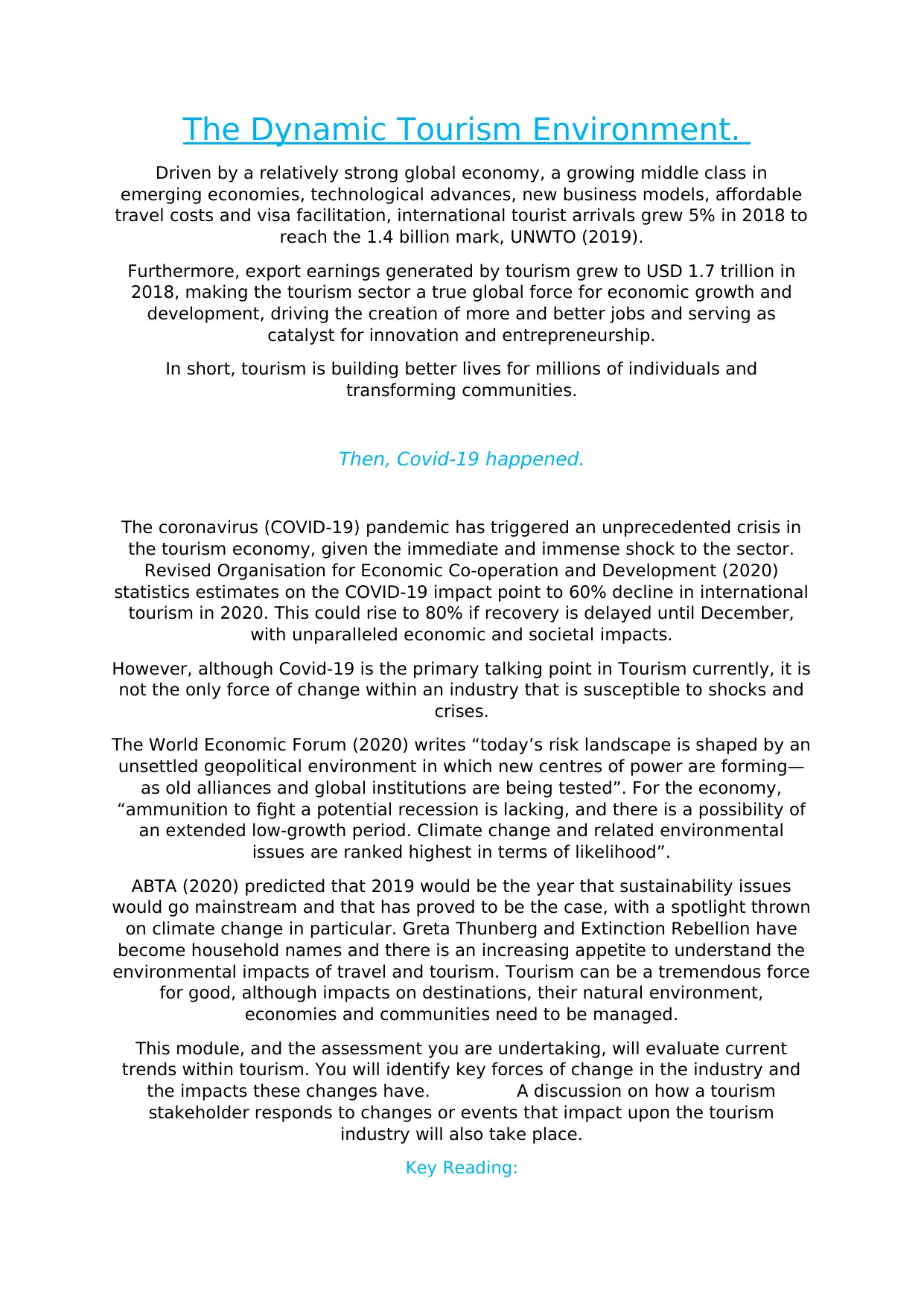
The Dynamic Tourism Environment.
Driven by a relatively strong global economy, a growing middle class in
emerging economies, technological advances, new business models, affordable
travel costs and visa facilitation, international tourist arrivals grew 5% in 2018 to
reach the 1.4 billion mark, UNWTO (2019).
Furthermore, export earnings generated by tourism grew to USD 1.7 trillion in
2018, making the tourism sector a true global force for economic growth and
development, driving the creation of more and better jobs and serving as
catalyst for innovation and entrepreneurship.
In short, tourism is building better lives for millions of individuals and
transforming communities.
Then, Covid-19 happened.
The coronavirus (COVID-19) pandemic has triggered an unprecedented crisis in
the tourism economy, given the immediate and immense shock to the sector.
Revised Organisation for Economic Co-operation and Development (2020)
statistics estimates on the COVID-19 impact point to 60% decline in international
tourism in 2020. This could rise to 80% if recovery is delayed until December,
with unparalleled economic and societal impacts.
However, although Covid-19 is the primary talking point in Tourism currently, it is
not the only force of change within an industry that is susceptible to shocks and
crises.
The World Economic Forum (2020) writes “today’s risk landscape is shaped by an
unsettled geopolitical environment in which new centres of power are forming—
as old alliances and global institutions are being tested”. For the economy,
“ammunition to fight a potential recession is lacking, and there is a possibility of
an extended low-growth period. Climate change and related environmental
issues are ranked highest in terms of likelihood”.
ABTA (2020) predicted that 2019 would be the year that sustainability issues
would go mainstream and that has proved to be the case, with a spotlight thrown
on climate change in particular. Greta Thunberg and Extinction Rebellion have
become household names and there is an increasing appetite to understand the
environmental impacts of travel and tourism. Tourism can be a tremendous force
for good, although impacts on destinations, their natural environment,
economies and communities need to be managed.
This module, and the assessment you are undertaking, will evaluate current
trends within tourism. You will identify key forces of change in the industry and
the impacts these changes have. A discussion on how a tourism
stakeholder responds to changes or events that impact upon the tourism
industry will also take place.
Key Reading:
Driven by a relatively strong global economy, a growing middle class in
emerging economies, technological advances, new business models, affordable
travel costs and visa facilitation, international tourist arrivals grew 5% in 2018 to
reach the 1.4 billion mark, UNWTO (2019).
Furthermore, export earnings generated by tourism grew to USD 1.7 trillion in
2018, making the tourism sector a true global force for economic growth and
development, driving the creation of more and better jobs and serving as
catalyst for innovation and entrepreneurship.
In short, tourism is building better lives for millions of individuals and
transforming communities.
Then, Covid-19 happened.
The coronavirus (COVID-19) pandemic has triggered an unprecedented crisis in
the tourism economy, given the immediate and immense shock to the sector.
Revised Organisation for Economic Co-operation and Development (2020)
statistics estimates on the COVID-19 impact point to 60% decline in international
tourism in 2020. This could rise to 80% if recovery is delayed until December,
with unparalleled economic and societal impacts.
However, although Covid-19 is the primary talking point in Tourism currently, it is
not the only force of change within an industry that is susceptible to shocks and
crises.
The World Economic Forum (2020) writes “today’s risk landscape is shaped by an
unsettled geopolitical environment in which new centres of power are forming—
as old alliances and global institutions are being tested”. For the economy,
“ammunition to fight a potential recession is lacking, and there is a possibility of
an extended low-growth period. Climate change and related environmental
issues are ranked highest in terms of likelihood”.
ABTA (2020) predicted that 2019 would be the year that sustainability issues
would go mainstream and that has proved to be the case, with a spotlight thrown
on climate change in particular. Greta Thunberg and Extinction Rebellion have
become household names and there is an increasing appetite to understand the
environmental impacts of travel and tourism. Tourism can be a tremendous force
for good, although impacts on destinations, their natural environment,
economies and communities need to be managed.
This module, and the assessment you are undertaking, will evaluate current
trends within tourism. You will identify key forces of change in the industry and
the impacts these changes have. A discussion on how a tourism
stakeholder responds to changes or events that impact upon the tourism
industry will also take place.
Key Reading:
Paraphrase This Document
Need a fresh take? Get an instant paraphrase of this document with our AI Paraphraser
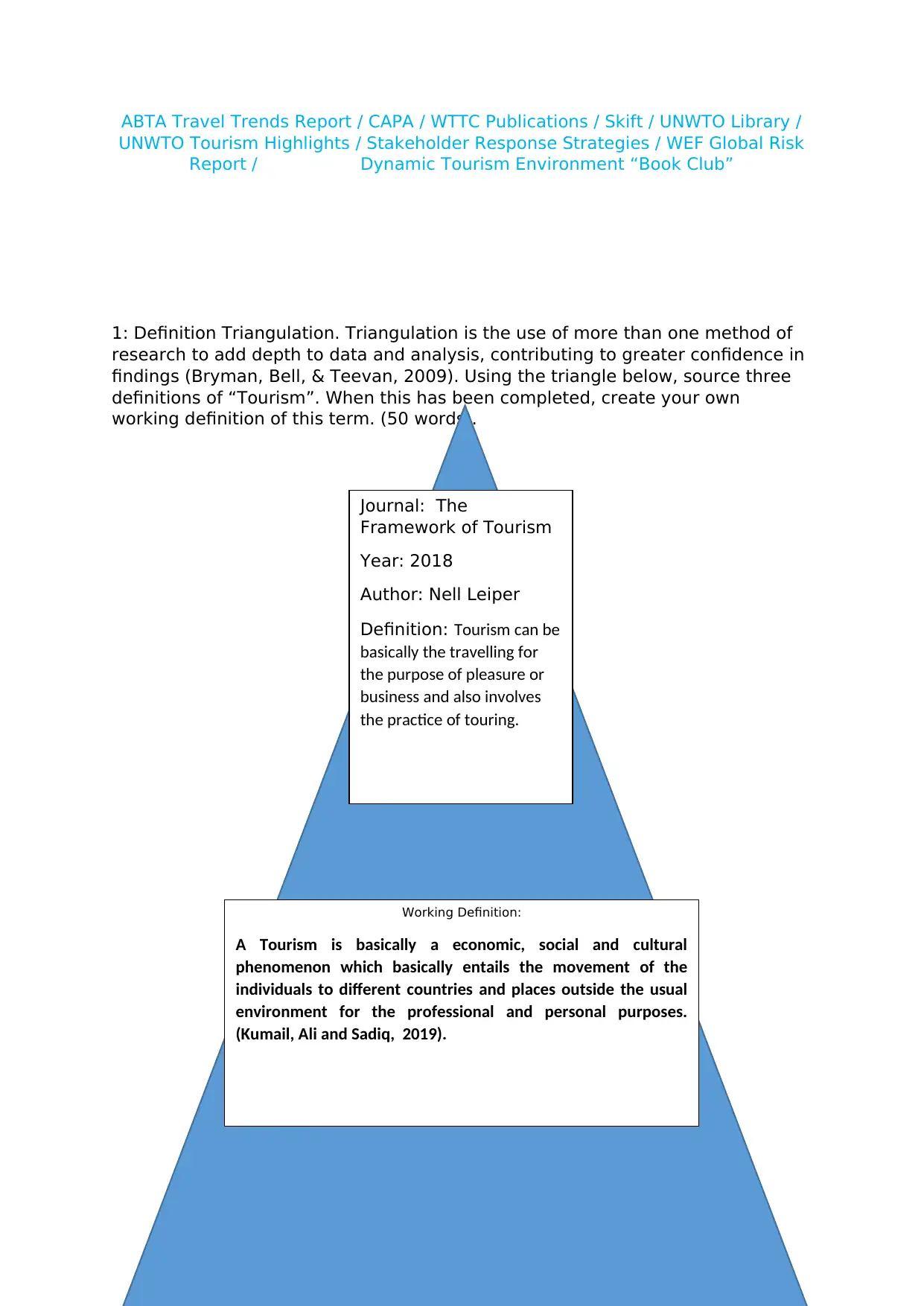
ABTA Travel Trends Report / CAPA / WTTC Publications / Skift / UNWTO Library /
UNWTO Tourism Highlights / Stakeholder Response Strategies / WEF Global Risk
Report / Dynamic Tourism Environment “Book Club”
1: Definition Triangulation. Triangulation is the use of more than one method of
research to add depth to data and analysis, contributing to greater confidence in
findings (Bryman, Bell, & Teevan, 2009). Using the triangle below, source three
definitions of “Tourism”. When this has been completed, create your own
working definition of this term. (50 words).
Journal: The
Framework of Tourism
Year: 2018
Author: Nell Leiper
Definition: Tourism can be
basically the travelling for
the purpose of pleasure or
business and also involves
the practice of touring.
Working Definition:
A Tourism is basically a economic, social and cultural
phenomenon which basically entails the movement of the
individuals to different countries and places outside the usual
environment for the professional and personal purposes.
(Kumail, Ali and Sadiq, 2019).
UNWTO Tourism Highlights / Stakeholder Response Strategies / WEF Global Risk
Report / Dynamic Tourism Environment “Book Club”
1: Definition Triangulation. Triangulation is the use of more than one method of
research to add depth to data and analysis, contributing to greater confidence in
findings (Bryman, Bell, & Teevan, 2009). Using the triangle below, source three
definitions of “Tourism”. When this has been completed, create your own
working definition of this term. (50 words).
Journal: The
Framework of Tourism
Year: 2018
Author: Nell Leiper
Definition: Tourism can be
basically the travelling for
the purpose of pleasure or
business and also involves
the practice of touring.
Working Definition:
A Tourism is basically a economic, social and cultural
phenomenon which basically entails the movement of the
individuals to different countries and places outside the usual
environment for the professional and personal purposes.
(Kumail, Ali and Sadiq, 2019).
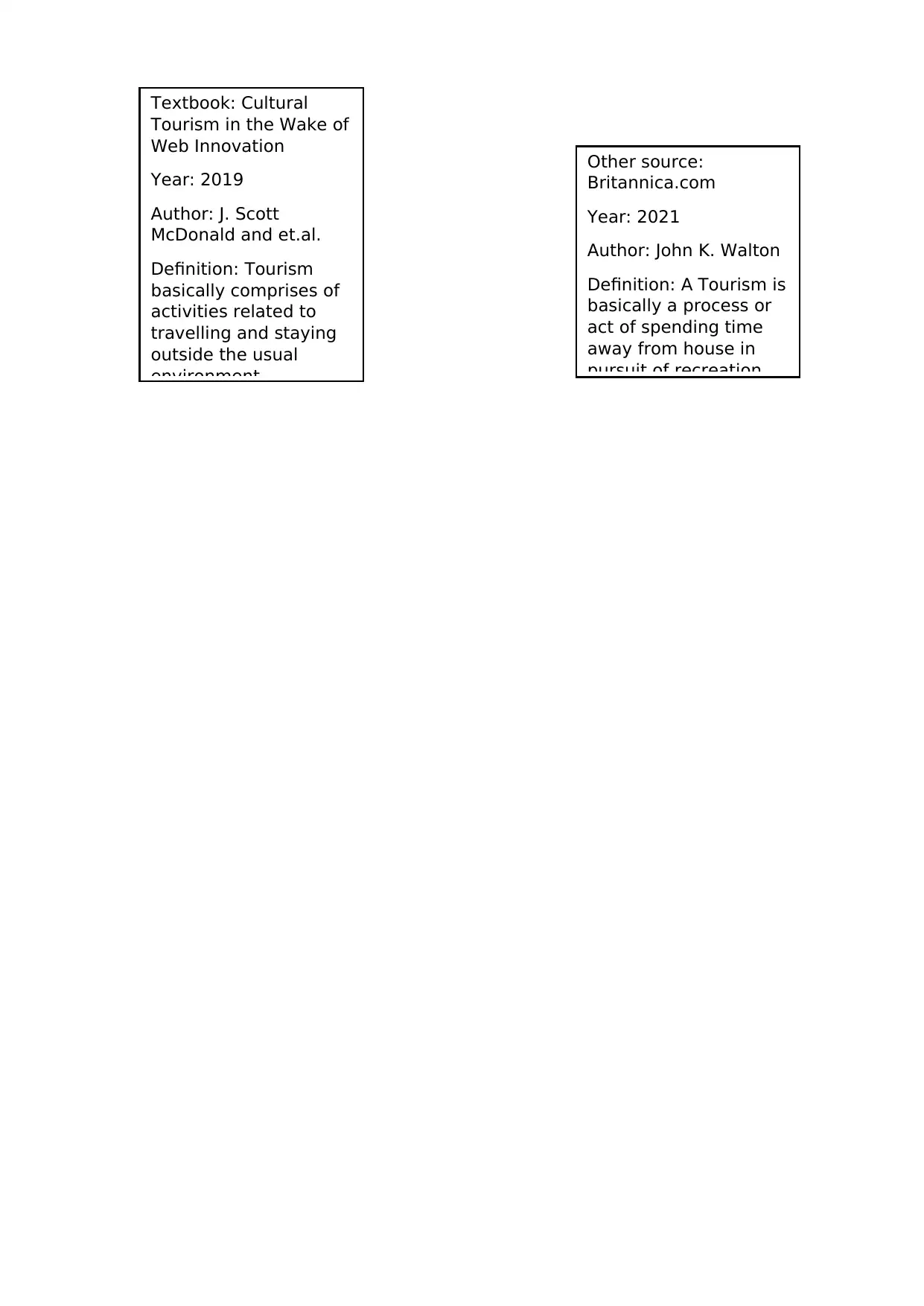
Textbook: Cultural
Tourism in the Wake of
Web Innovation
Year: 2019
Author: J. Scott
McDonald and et.al.
Definition: Tourism
basically comprises of
activities related to
travelling and staying
outside the usual
environment.
Other source:
Britannica.com
Year: 2021
Author: John K. Walton
Definition: A Tourism is
basically a process or
act of spending time
away from house in
pursuit of recreation,
Tourism in the Wake of
Web Innovation
Year: 2019
Author: J. Scott
McDonald and et.al.
Definition: Tourism
basically comprises of
activities related to
travelling and staying
outside the usual
environment.
Other source:
Britannica.com
Year: 2021
Author: John K. Walton
Definition: A Tourism is
basically a process or
act of spending time
away from house in
pursuit of recreation,
⊘ This is a preview!⊘
Do you want full access?
Subscribe today to unlock all pages.

Trusted by 1+ million students worldwide
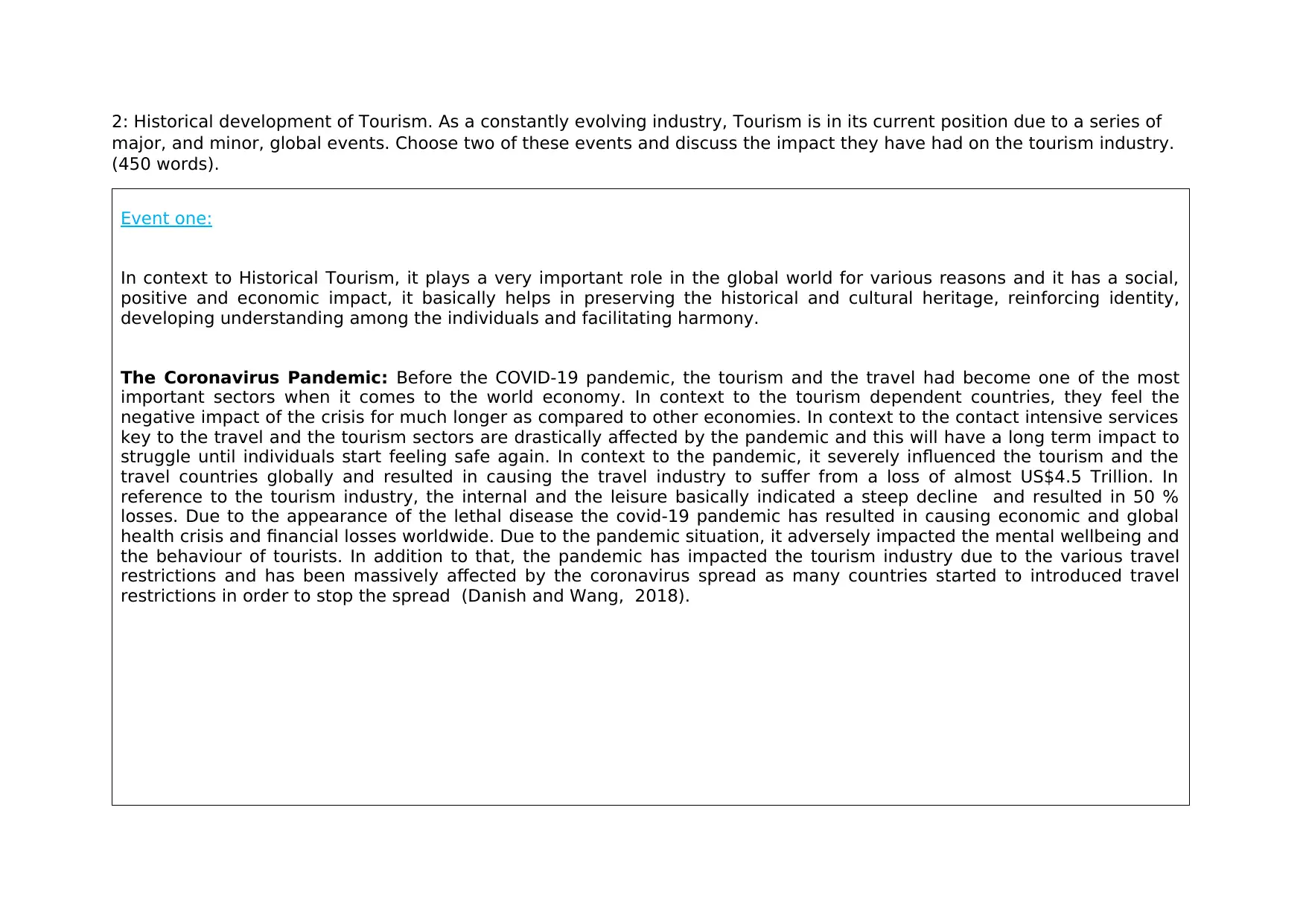
2: Historical development of Tourism. As a constantly evolving industry, Tourism is in its current position due to a series of
major, and minor, global events. Choose two of these events and discuss the impact they have had on the tourism industry.
(450 words).
Event one:
In context to Historical Tourism, it plays a very important role in the global world for various reasons and it has a social,
positive and economic impact, it basically helps in preserving the historical and cultural heritage, reinforcing identity,
developing understanding among the individuals and facilitating harmony.
The Coronavirus Pandemic: Before the COVID-19 pandemic, the tourism and the travel had become one of the most
important sectors when it comes to the world economy. In context to the tourism dependent countries, they feel the
negative impact of the crisis for much longer as compared to other economies. In context to the contact intensive services
key to the travel and the tourism sectors are drastically affected by the pandemic and this will have a long term impact to
struggle until individuals start feeling safe again. In context to the pandemic, it severely influenced the tourism and the
travel countries globally and resulted in causing the travel industry to suffer from a loss of almost US$4.5 Trillion. In
reference to the tourism industry, the internal and the leisure basically indicated a steep decline and resulted in 50 %
losses. Due to the appearance of the lethal disease the covid-19 pandemic has resulted in causing economic and global
health crisis and financial losses worldwide. Due to the pandemic situation, it adversely impacted the mental wellbeing and
the behaviour of tourists. In addition to that, the pandemic has impacted the tourism industry due to the various travel
restrictions and has been massively affected by the coronavirus spread as many countries started to introduced travel
restrictions in order to stop the spread (Danish and Wang, 2018).
major, and minor, global events. Choose two of these events and discuss the impact they have had on the tourism industry.
(450 words).
Event one:
In context to Historical Tourism, it plays a very important role in the global world for various reasons and it has a social,
positive and economic impact, it basically helps in preserving the historical and cultural heritage, reinforcing identity,
developing understanding among the individuals and facilitating harmony.
The Coronavirus Pandemic: Before the COVID-19 pandemic, the tourism and the travel had become one of the most
important sectors when it comes to the world economy. In context to the tourism dependent countries, they feel the
negative impact of the crisis for much longer as compared to other economies. In context to the contact intensive services
key to the travel and the tourism sectors are drastically affected by the pandemic and this will have a long term impact to
struggle until individuals start feeling safe again. In context to the pandemic, it severely influenced the tourism and the
travel countries globally and resulted in causing the travel industry to suffer from a loss of almost US$4.5 Trillion. In
reference to the tourism industry, the internal and the leisure basically indicated a steep decline and resulted in 50 %
losses. Due to the appearance of the lethal disease the covid-19 pandemic has resulted in causing economic and global
health crisis and financial losses worldwide. Due to the pandemic situation, it adversely impacted the mental wellbeing and
the behaviour of tourists. In addition to that, the pandemic has impacted the tourism industry due to the various travel
restrictions and has been massively affected by the coronavirus spread as many countries started to introduced travel
restrictions in order to stop the spread (Danish and Wang, 2018).
Paraphrase This Document
Need a fresh take? Get an instant paraphrase of this document with our AI Paraphraser
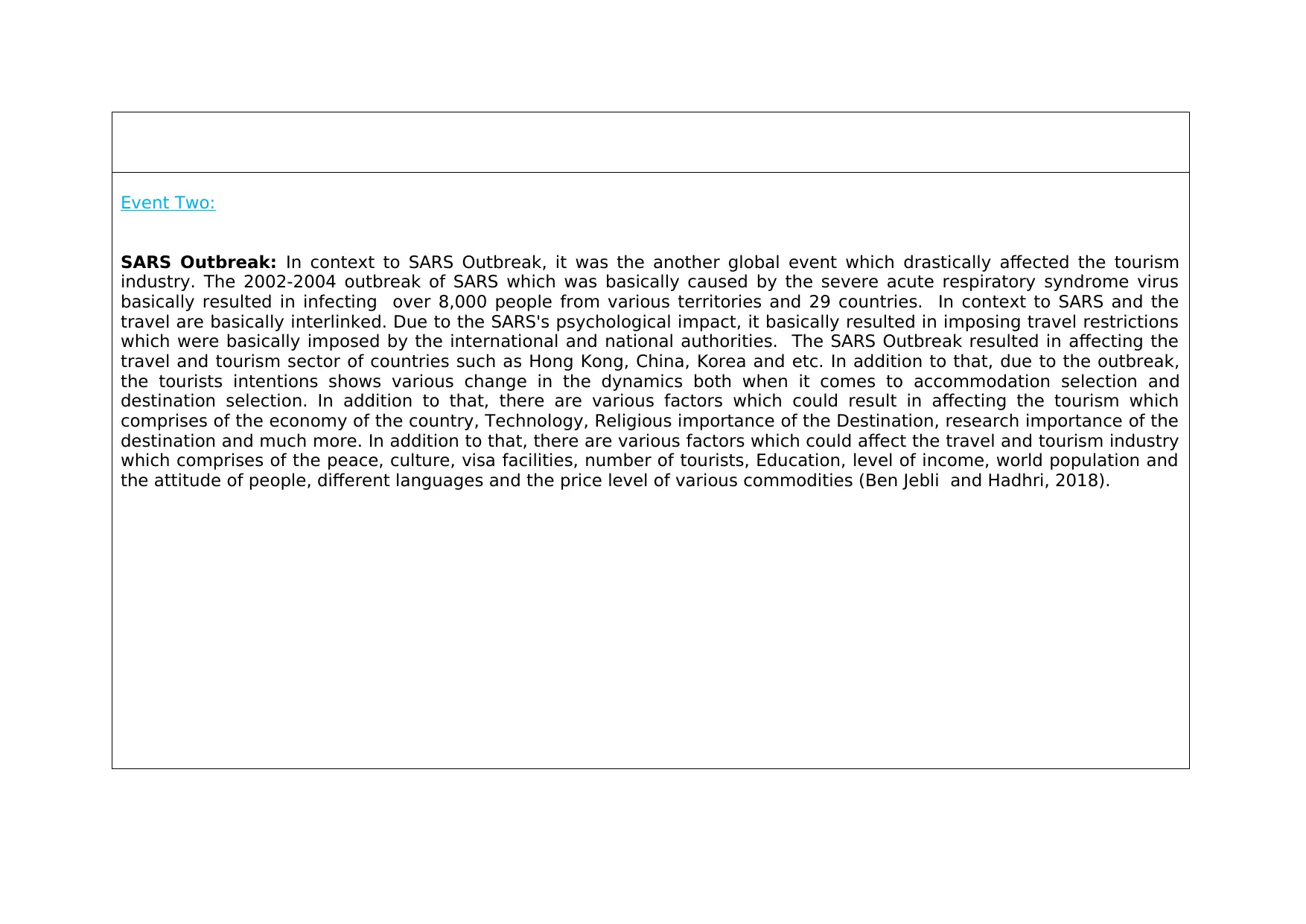
Event Two:
SARS Outbreak: In context to SARS Outbreak, it was the another global event which drastically affected the tourism
industry. The 2002-2004 outbreak of SARS which was basically caused by the severe acute respiratory syndrome virus
basically resulted in infecting over 8,000 people from various territories and 29 countries. In context to SARS and the
travel are basically interlinked. Due to the SARS's psychological impact, it basically resulted in imposing travel restrictions
which were basically imposed by the international and national authorities. The SARS Outbreak resulted in affecting the
travel and tourism sector of countries such as Hong Kong, China, Korea and etc. In addition to that, due to the outbreak,
the tourists intentions shows various change in the dynamics both when it comes to accommodation selection and
destination selection. In addition to that, there are various factors which could result in affecting the tourism which
comprises of the economy of the country, Technology, Religious importance of the Destination, research importance of the
destination and much more. In addition to that, there are various factors which could affect the travel and tourism industry
which comprises of the peace, culture, visa facilities, number of tourists, Education, level of income, world population and
the attitude of people, different languages and the price level of various commodities (Ben Jebli and Hadhri, 2018).
SARS Outbreak: In context to SARS Outbreak, it was the another global event which drastically affected the tourism
industry. The 2002-2004 outbreak of SARS which was basically caused by the severe acute respiratory syndrome virus
basically resulted in infecting over 8,000 people from various territories and 29 countries. In context to SARS and the
travel are basically interlinked. Due to the SARS's psychological impact, it basically resulted in imposing travel restrictions
which were basically imposed by the international and national authorities. The SARS Outbreak resulted in affecting the
travel and tourism sector of countries such as Hong Kong, China, Korea and etc. In addition to that, due to the outbreak,
the tourists intentions shows various change in the dynamics both when it comes to accommodation selection and
destination selection. In addition to that, there are various factors which could result in affecting the tourism which
comprises of the economy of the country, Technology, Religious importance of the Destination, research importance of the
destination and much more. In addition to that, there are various factors which could affect the travel and tourism industry
which comprises of the peace, culture, visa facilities, number of tourists, Education, level of income, world population and
the attitude of people, different languages and the price level of various commodities (Ben Jebli and Hadhri, 2018).
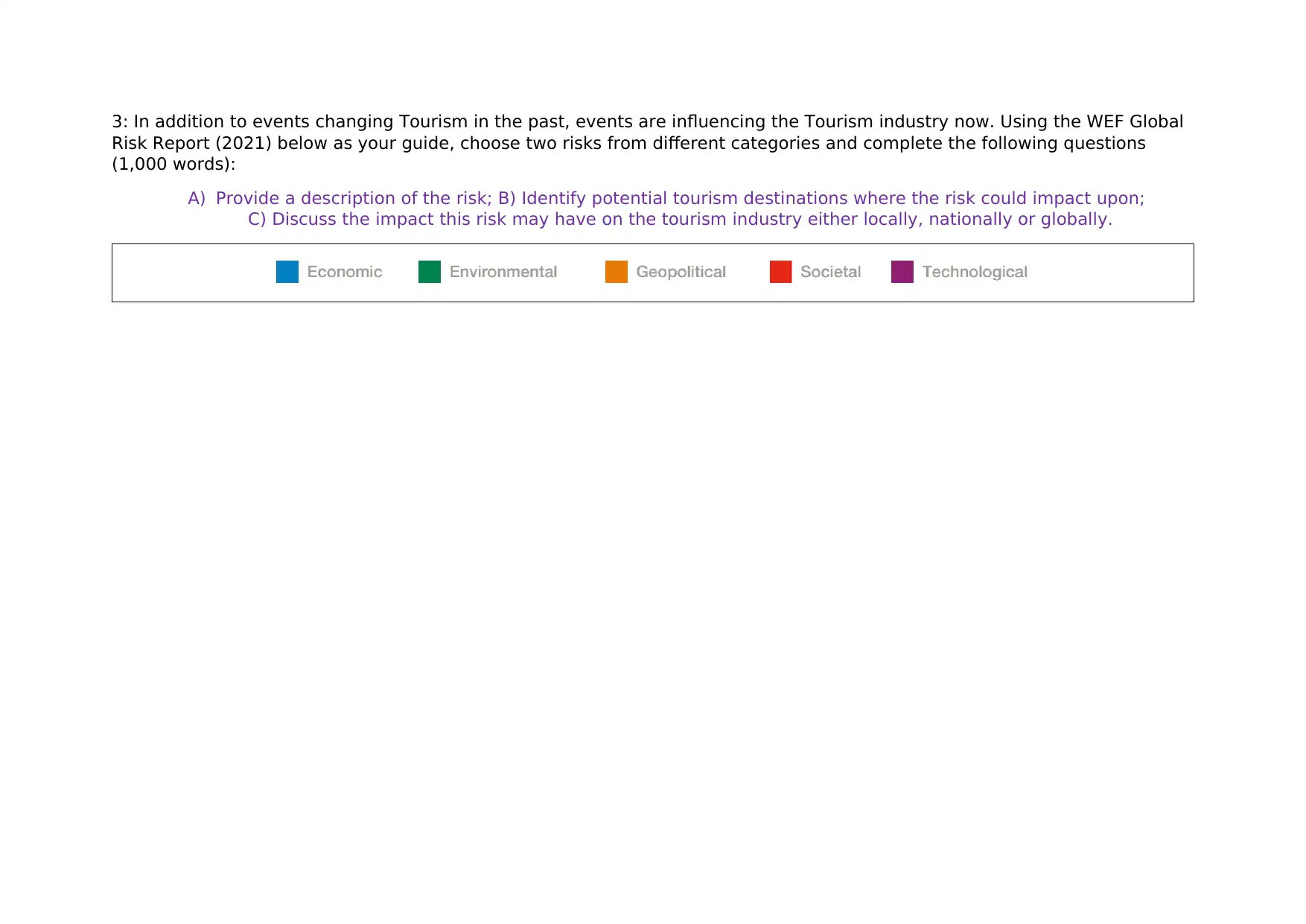
3: In addition to events changing Tourism in the past, events are influencing the Tourism industry now. Using the WEF Global
Risk Report (2021) below as your guide, choose two risks from different categories and complete the following questions
(1,000 words):
A) Provide a description of the risk; B) Identify potential tourism destinations where the risk could impact upon;
C) Discuss the impact this risk may have on the tourism industry either locally, nationally or globally.
Risk Report (2021) below as your guide, choose two risks from different categories and complete the following questions
(1,000 words):
A) Provide a description of the risk; B) Identify potential tourism destinations where the risk could impact upon;
C) Discuss the impact this risk may have on the tourism industry either locally, nationally or globally.
⊘ This is a preview!⊘
Do you want full access?
Subscribe today to unlock all pages.

Trusted by 1+ million students worldwide
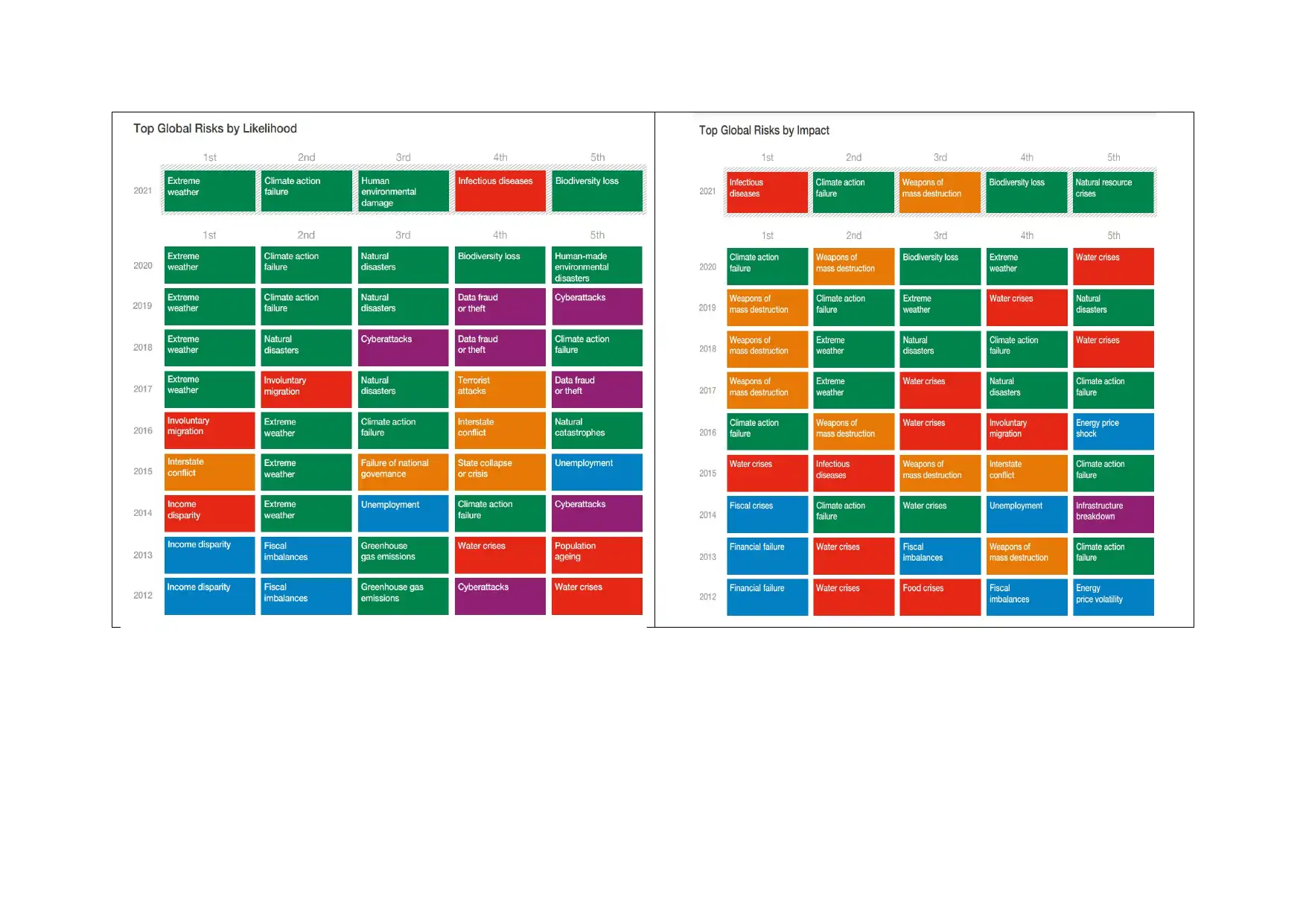
Paraphrase This Document
Need a fresh take? Get an instant paraphrase of this document with our AI Paraphraser
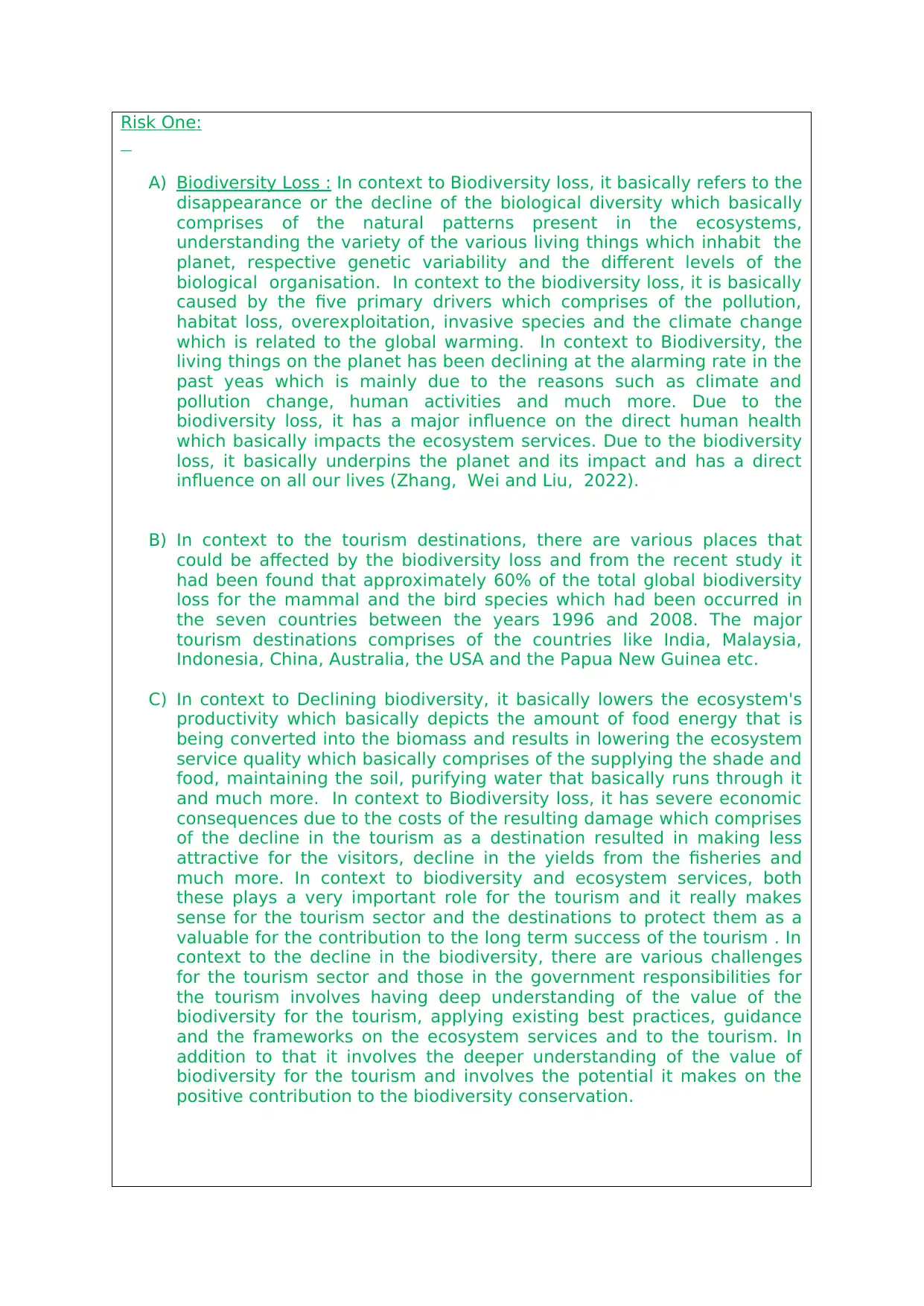
Risk One:
A) Biodiversity Loss : In context to Biodiversity loss, it basically refers to the
disappearance or the decline of the biological diversity which basically
comprises of the natural patterns present in the ecosystems,
understanding the variety of the various living things which inhabit the
planet, respective genetic variability and the different levels of the
biological organisation. In context to the biodiversity loss, it is basically
caused by the five primary drivers which comprises of the pollution,
habitat loss, overexploitation, invasive species and the climate change
which is related to the global warming. In context to Biodiversity, the
living things on the planet has been declining at the alarming rate in the
past yeas which is mainly due to the reasons such as climate and
pollution change, human activities and much more. Due to the
biodiversity loss, it has a major influence on the direct human health
which basically impacts the ecosystem services. Due to the biodiversity
loss, it basically underpins the planet and its impact and has a direct
influence on all our lives (Zhang, Wei and Liu, 2022).
B) In context to the tourism destinations, there are various places that
could be affected by the biodiversity loss and from the recent study it
had been found that approximately 60% of the total global biodiversity
loss for the mammal and the bird species which had been occurred in
the seven countries between the years 1996 and 2008. The major
tourism destinations comprises of the countries like India, Malaysia,
Indonesia, China, Australia, the USA and the Papua New Guinea etc.
C) In context to Declining biodiversity, it basically lowers the ecosystem's
productivity which basically depicts the amount of food energy that is
being converted into the biomass and results in lowering the ecosystem
service quality which basically comprises of the supplying the shade and
food, maintaining the soil, purifying water that basically runs through it
and much more. In context to Biodiversity loss, it has severe economic
consequences due to the costs of the resulting damage which comprises
of the decline in the tourism as a destination resulted in making less
attractive for the visitors, decline in the yields from the fisheries and
much more. In context to biodiversity and ecosystem services, both
these plays a very important role for the tourism and it really makes
sense for the tourism sector and the destinations to protect them as a
valuable for the contribution to the long term success of the tourism . In
context to the decline in the biodiversity, there are various challenges
for the tourism sector and those in the government responsibilities for
the tourism involves having deep understanding of the value of the
biodiversity for the tourism, applying existing best practices, guidance
and the frameworks on the ecosystem services and to the tourism. In
addition to that it involves the deeper understanding of the value of
biodiversity for the tourism and involves the potential it makes on the
positive contribution to the biodiversity conservation.
A) Biodiversity Loss : In context to Biodiversity loss, it basically refers to the
disappearance or the decline of the biological diversity which basically
comprises of the natural patterns present in the ecosystems,
understanding the variety of the various living things which inhabit the
planet, respective genetic variability and the different levels of the
biological organisation. In context to the biodiversity loss, it is basically
caused by the five primary drivers which comprises of the pollution,
habitat loss, overexploitation, invasive species and the climate change
which is related to the global warming. In context to Biodiversity, the
living things on the planet has been declining at the alarming rate in the
past yeas which is mainly due to the reasons such as climate and
pollution change, human activities and much more. Due to the
biodiversity loss, it has a major influence on the direct human health
which basically impacts the ecosystem services. Due to the biodiversity
loss, it basically underpins the planet and its impact and has a direct
influence on all our lives (Zhang, Wei and Liu, 2022).
B) In context to the tourism destinations, there are various places that
could be affected by the biodiversity loss and from the recent study it
had been found that approximately 60% of the total global biodiversity
loss for the mammal and the bird species which had been occurred in
the seven countries between the years 1996 and 2008. The major
tourism destinations comprises of the countries like India, Malaysia,
Indonesia, China, Australia, the USA and the Papua New Guinea etc.
C) In context to Declining biodiversity, it basically lowers the ecosystem's
productivity which basically depicts the amount of food energy that is
being converted into the biomass and results in lowering the ecosystem
service quality which basically comprises of the supplying the shade and
food, maintaining the soil, purifying water that basically runs through it
and much more. In context to Biodiversity loss, it has severe economic
consequences due to the costs of the resulting damage which comprises
of the decline in the tourism as a destination resulted in making less
attractive for the visitors, decline in the yields from the fisheries and
much more. In context to biodiversity and ecosystem services, both
these plays a very important role for the tourism and it really makes
sense for the tourism sector and the destinations to protect them as a
valuable for the contribution to the long term success of the tourism . In
context to the decline in the biodiversity, there are various challenges
for the tourism sector and those in the government responsibilities for
the tourism involves having deep understanding of the value of the
biodiversity for the tourism, applying existing best practices, guidance
and the frameworks on the ecosystem services and to the tourism. In
addition to that it involves the deeper understanding of the value of
biodiversity for the tourism and involves the potential it makes on the
positive contribution to the biodiversity conservation.
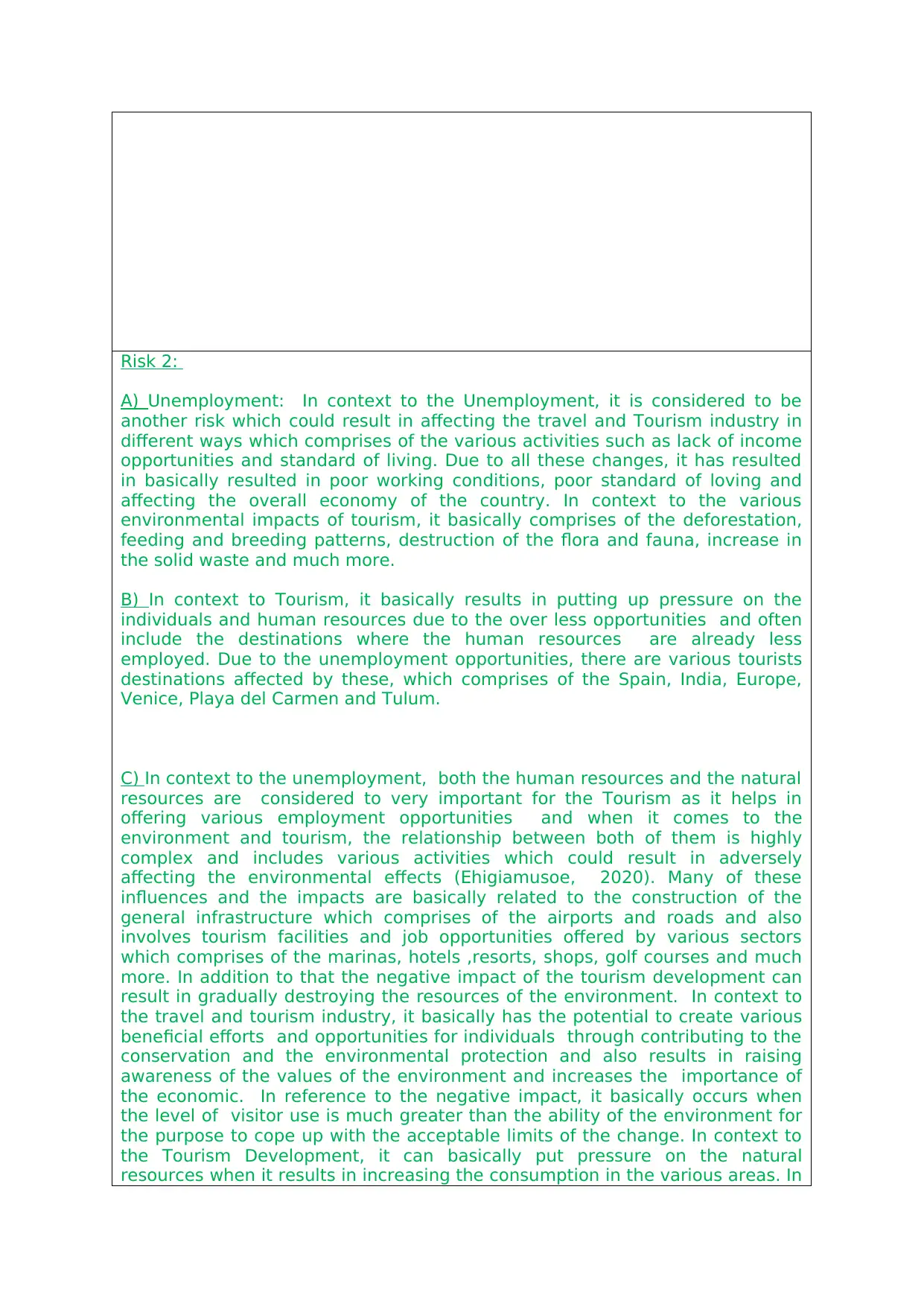
Risk 2:
A) Unemployment: In context to the Unemployment, it is considered to be
another risk which could result in affecting the travel and Tourism industry in
different ways which comprises of the various activities such as lack of income
opportunities and standard of living. Due to all these changes, it has resulted
in basically resulted in poor working conditions, poor standard of loving and
affecting the overall economy of the country. In context to the various
environmental impacts of tourism, it basically comprises of the deforestation,
feeding and breeding patterns, destruction of the flora and fauna, increase in
the solid waste and much more.
B) In context to Tourism, it basically results in putting up pressure on the
individuals and human resources due to the over less opportunities and often
include the destinations where the human resources are already less
employed. Due to the unemployment opportunities, there are various tourists
destinations affected by these, which comprises of the Spain, India, Europe,
Venice, Playa del Carmen and Tulum.
C) In context to the unemployment, both the human resources and the natural
resources are considered to very important for the Tourism as it helps in
offering various employment opportunities and when it comes to the
environment and tourism, the relationship between both of them is highly
complex and includes various activities which could result in adversely
affecting the environmental effects (Ehigiamusoe, 2020). Many of these
influences and the impacts are basically related to the construction of the
general infrastructure which comprises of the airports and roads and also
involves tourism facilities and job opportunities offered by various sectors
which comprises of the marinas, hotels ,resorts, shops, golf courses and much
more. In addition to that the negative impact of the tourism development can
result in gradually destroying the resources of the environment. In context to
the travel and tourism industry, it basically has the potential to create various
beneficial efforts and opportunities for individuals through contributing to the
conservation and the environmental protection and also results in raising
awareness of the values of the environment and increases the importance of
the economic. In reference to the negative impact, it basically occurs when
the level of visitor use is much greater than the ability of the environment for
the purpose to cope up with the acceptable limits of the change. In context to
the Tourism Development, it can basically put pressure on the natural
resources when it results in increasing the consumption in the various areas. In
A) Unemployment: In context to the Unemployment, it is considered to be
another risk which could result in affecting the travel and Tourism industry in
different ways which comprises of the various activities such as lack of income
opportunities and standard of living. Due to all these changes, it has resulted
in basically resulted in poor working conditions, poor standard of loving and
affecting the overall economy of the country. In context to the various
environmental impacts of tourism, it basically comprises of the deforestation,
feeding and breeding patterns, destruction of the flora and fauna, increase in
the solid waste and much more.
B) In context to Tourism, it basically results in putting up pressure on the
individuals and human resources due to the over less opportunities and often
include the destinations where the human resources are already less
employed. Due to the unemployment opportunities, there are various tourists
destinations affected by these, which comprises of the Spain, India, Europe,
Venice, Playa del Carmen and Tulum.
C) In context to the unemployment, both the human resources and the natural
resources are considered to very important for the Tourism as it helps in
offering various employment opportunities and when it comes to the
environment and tourism, the relationship between both of them is highly
complex and includes various activities which could result in adversely
affecting the environmental effects (Ehigiamusoe, 2020). Many of these
influences and the impacts are basically related to the construction of the
general infrastructure which comprises of the airports and roads and also
involves tourism facilities and job opportunities offered by various sectors
which comprises of the marinas, hotels ,resorts, shops, golf courses and much
more. In addition to that the negative impact of the tourism development can
result in gradually destroying the resources of the environment. In context to
the travel and tourism industry, it basically has the potential to create various
beneficial efforts and opportunities for individuals through contributing to the
conservation and the environmental protection and also results in raising
awareness of the values of the environment and increases the importance of
the economic. In reference to the negative impact, it basically occurs when
the level of visitor use is much greater than the ability of the environment for
the purpose to cope up with the acceptable limits of the change. In context to
the Tourism Development, it can basically put pressure on the natural
resources when it results in increasing the consumption in the various areas. In
⊘ This is a preview!⊘
Do you want full access?
Subscribe today to unlock all pages.

Trusted by 1+ million students worldwide
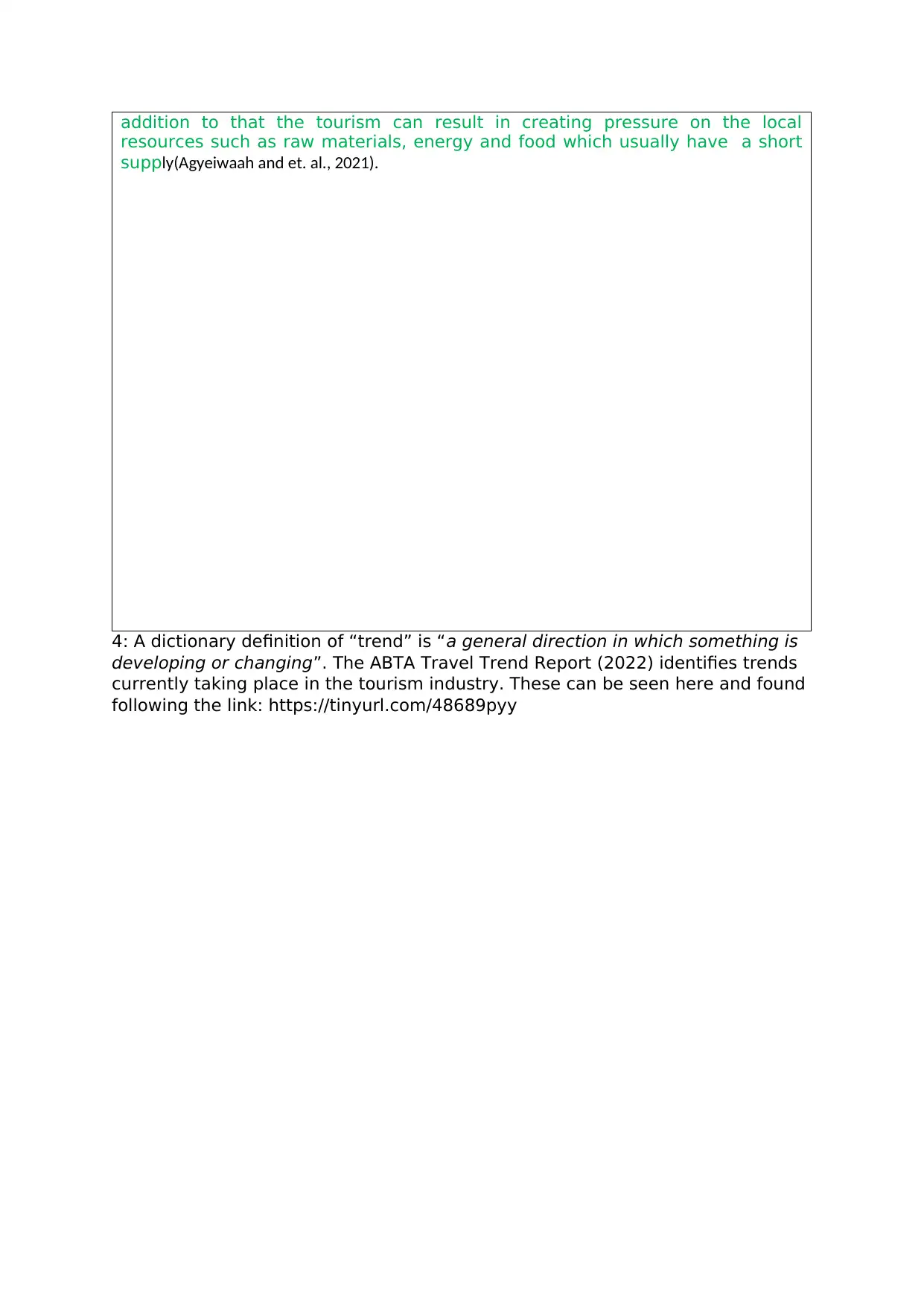
addition to that the tourism can result in creating pressure on the local
resources such as raw materials, energy and food which usually have a short
supply(Agyeiwaah and et. al., 2021).
4: A dictionary definition of “trend” is “a general direction in which something is
developing or changing”. The ABTA Travel Trend Report (2022) identifies trends
currently taking place in the tourism industry. These can be seen here and found
following the link: https://tinyurl.com/48689pyy
resources such as raw materials, energy and food which usually have a short
supply(Agyeiwaah and et. al., 2021).
4: A dictionary definition of “trend” is “a general direction in which something is
developing or changing”. The ABTA Travel Trend Report (2022) identifies trends
currently taking place in the tourism industry. These can be seen here and found
following the link: https://tinyurl.com/48689pyy
Paraphrase This Document
Need a fresh take? Get an instant paraphrase of this document with our AI Paraphraser
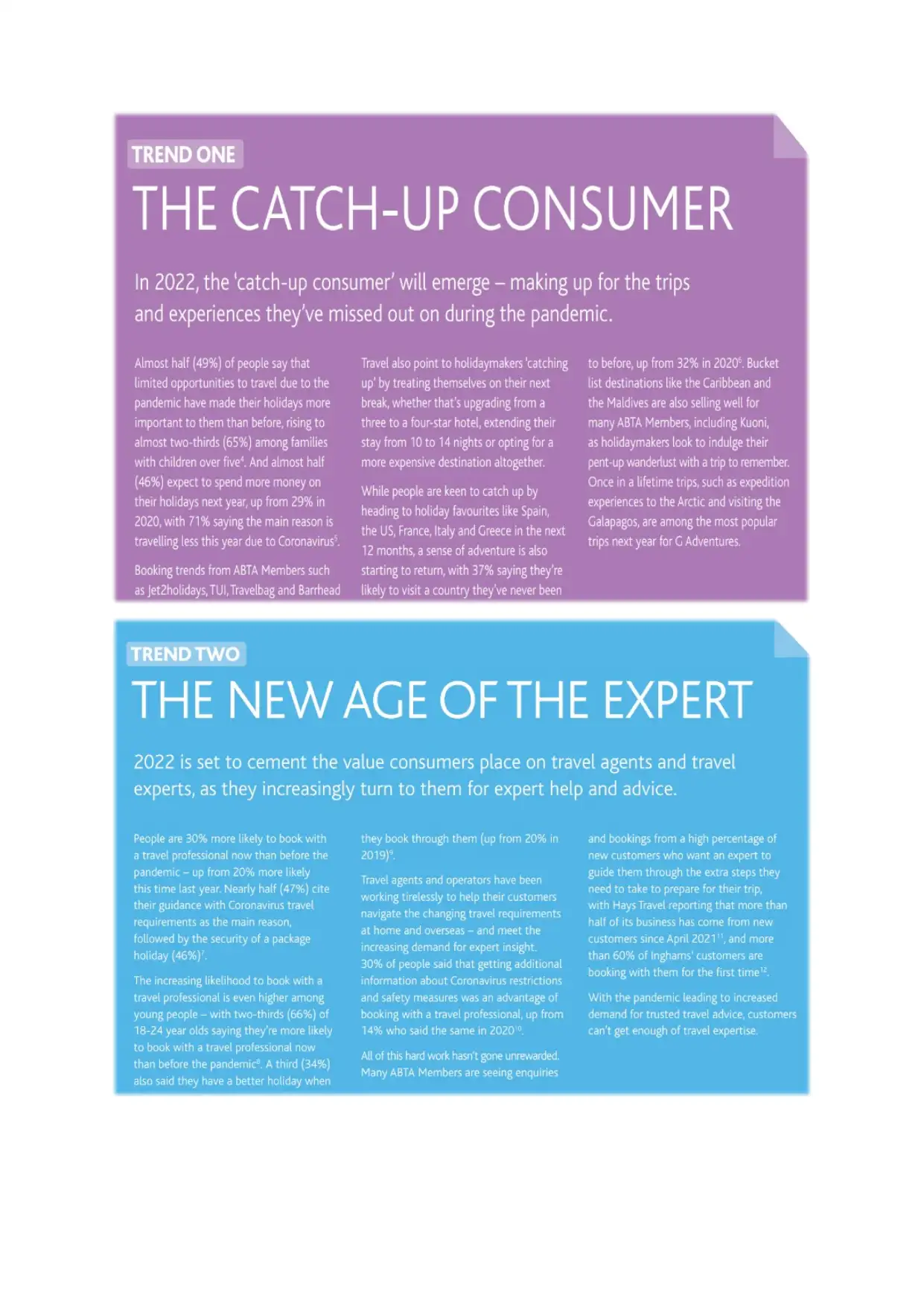
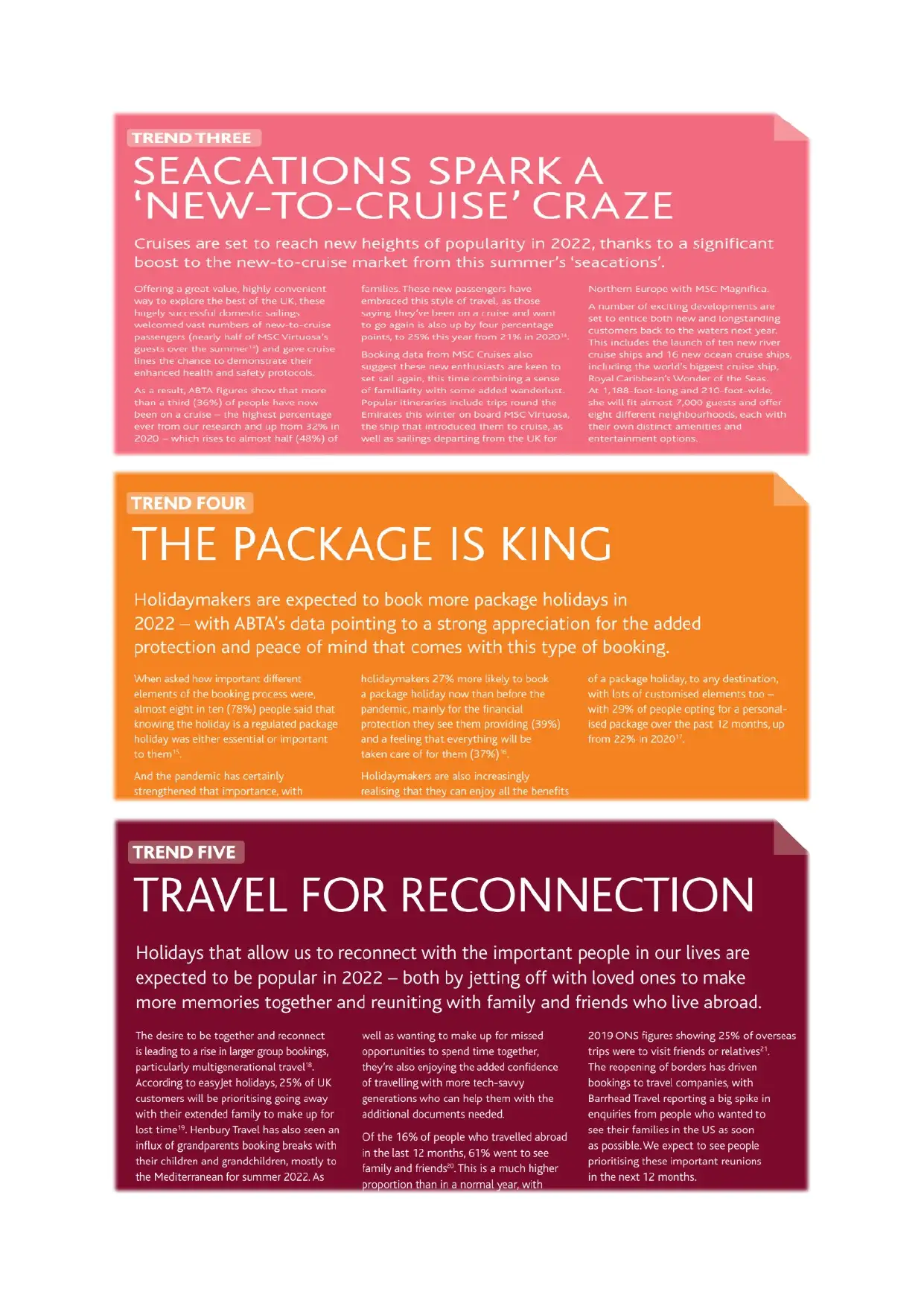
⊘ This is a preview!⊘
Do you want full access?
Subscribe today to unlock all pages.

Trusted by 1+ million students worldwide
1 out of 17
Related Documents
Your All-in-One AI-Powered Toolkit for Academic Success.
+13062052269
info@desklib.com
Available 24*7 on WhatsApp / Email
![[object Object]](/_next/static/media/star-bottom.7253800d.svg)
Unlock your academic potential
Copyright © 2020–2026 A2Z Services. All Rights Reserved. Developed and managed by ZUCOL.


